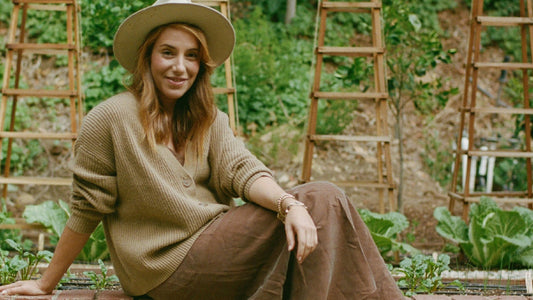
Photos: Safia Minney
It’s almost holiday shopping season, when the urge to institute a 1 for 1 rule— “Buy one gift for them and one gift for me!”—is very real. So we called up Safia Minney, the British founder of People Tree and author of Regenerative Fashion, a new book that explains the principles and possibilities of “fashion that isn’t just for now; it’s for the future.”
Here’s what Safia wants us to know about shopping for our real lives,
How is regenerative fashion different from sustainable fashion?
That’s a very big question… At the core, I think sustainable fashion is about low-impact materials—you know, organic cotton, linens, nettle, and recycled fibers… Regenerative fashion takes it further, because it’s not just a lower impact in terms of nature. Regenerative fashion has a social impact, and it promotes renewal ecologically and socially.If we’re doing it right, how can regenerative fashion change the world?
The central thesis of my book is that we need almost a “warlike” effort to take the problem of pollution out of fashion. We’ve got fossil fuels, we’ve got synthetic fertilizers and pesticides for cotton fields, toxic dye methods—so we need to regenerate the fashion industry by changing its core, systemically… We need to deliver on a wellbeing economy that will be great for everyone through fair trade practices, too. Not just for those of us living in high income countries, but also people living in the Global South who, frankly, have produced only 8% of the world’s carbon emissions but bear the brunt of 90% of climate disasters. That’s just not right.

Why shouldn’t we just stop making clothes altogether?
[Laughing] Is that what you want?!No!
No. Look, fashion is art, it’s self-expression, it’s identity, it’s practicality… it can also be a part of someone’s liberation. Fashion employs tens of millions of people, and so many are women. The answer isn’t “cancel fashion.” The answer is radical transformation. I like what Fashion Declares is doing in the space, for example, because they’re not trying to “cancel” anything, they’re trying to inspire real change… And yes, we have to shift from buying, you know, 20-odd new products a year to probably just buying two or three, aside from socks and underwear. And if we're really taking care to buy beautifully produced, nice things that we'll treasure, that can be enough!As women, our bodies do change a lot, and sometimes clothes that used to feel amazing suddenly don’t fit our physical or emotional selves. What’s your advice for those moments when our whole being is screaming, “I want to trash everything and start over!”
I’ve been there! I have noticed in the last year, the shape of my body changed, and also, I always felt that I was quite a feminine dresser and that started to shift. Like recently, I've been buying men's trousers and wearing them tightly belted. I don't know what's going on, but I love it!

That sounds very cool. Where did you buy them?
Shopping secondhand, doing swaps with friends, even seeing what was already in the closet that I hadn’t thought about in a while.How do you fight that urge to buy something when you’re not feeling amazing?
By feeling secure in your style, you know you’ve got something you really love to pull out when the weather turns, or when you’ve got an important event. It’s like a psychological weight off your shoulders to say, “Oh it’s raining, I know exactly what coat I get to wear.” And because it’s well-made and you’ve put real thought into it, you’re excited to wear it. You pull it out, and then you can focus on the rest of your day—your relationships, your career, your creativity. You can just get on with it, rather than wondering if you look good.Because you know you look good.
Exactly! The older I’ve gotten, the more I’ve learned that changing clothes and makeup every ten seconds doesn’t seem to make us look or feel much better. Buying something just to buy it won’t make you feel good. But wearing something you love will.Can you please tell us your favorite animal fact?
Do you know cats spend 70% of their lives sleeping? I’m trying to lower my carbon lifestyle, so getting a pet was at the bottom of my list, but my partner really wanted one. I finally agreed to take a friends’ kitten. We feed it Yora, an insect and oat-based cat food that’s low impact… Do you want a wild animal fact, too?Yes.
Polar bears have black skin. This helps it to absorb heat from the sun to stay warm in the Arctic climate, and it likely protects the bear from harmful UV rays.
Regenerative Fashion by Safia Minney OBE is available on November 29, 2022.



